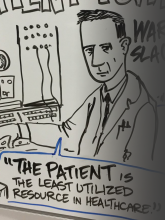The effect of computer-based reminders on the management of hospitalized patients with worsening renal function.
| Title | The effect of computer-based reminders on the management of hospitalized patients with worsening renal function. |
| Publication Type | Journal Article |
| Year of Publication | 1991 |
| Authors | Rind DM, Safran C, Phillips RS, SLACK WV, Calkins DR, Delbanco TL, Bleich HL |
| Journal | Proc Annu Symp Comput Appl Med Care |
| Pagination | 28-32 |
| Date Published | 1991 |
| ISSN | 0195-4210 |
| Keywords | Aged, Aminoglycosides, Angiotensin-Converting Enzyme Inhibitors, Anti-Bacterial Agents, Anti-Inflammatory Agents, Non-Steroidal, Creatinine, Drug Therapy, Computer-Assisted, Female, Humans, Kidney Diseases, Male, Middle Aged, Monitoring, Physiologic, Prospective Studies, Reminder Systems |
| Abstract | We performed a prospective time-series study to determine whether computerized reminders to physicians about rising creatinine levels in hospitalized patients receiving nephrotoxic and renally excreted medications led to more rapid adjustment or discontinuation of those medications, and to evaluate physician acceptance of computerized reminders. Laboratory data were followed on 10,076 patients over 13,703 admissions generating 1104 events of rising creatinine levels during treatment with nephrotoxic or renally excreted medications. During the intervention period, medications were adjusted or discontinued an average of 21.1 hours sooner (p less than 0.0001) after such an event occurred when compared with the control period. This effect of the reminders was strongest for patients receiving renally excreted and mildly nephrotoxic medications. Of physicians who responded to a computerized survey, 53% said that the reminders had been helpful in the care of their patients, while 31% felt that the reminders were annoying. Seventy-three percent wished to continue receiving computerized reminders. We conclude that computerized reminders are well-accepted in our hospital and have a strong effect on physician behavior. |
| Alternate Journal | Proc Annu Symp Comput Appl Med Care |
| PubMed ID | 1807605 |
| PubMed Central ID | PMC2247489 |
PDF:




